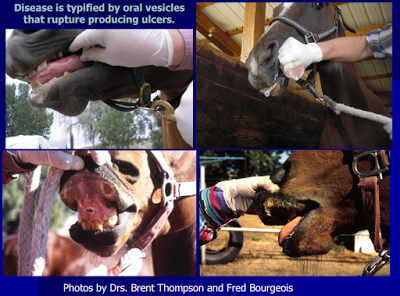Vesicular Stomatitis (VS or VSV) is a viral disease that primarily affects cattle, horses, and swine and occasionally sheep, goats, llamas, and alpacas. Humans can also become infected with the disease when handling affected animals, but this is a rare event. The main sign in animals is oral disease appearing as mucosal vesicles and ulcers in the mouth, but also on the udder and around the coronary band. Animals may show systemic signs such as anorexia, lethargy and pyrexia. Disease usually resolves within two weeks, and animals usually recover completely.
To stay up to date on the most recent developments in Colorado follow this link: Colorado Board of Agriculture on VSV
The best way to prevent VS (VSV) is good fly control. Insecticide’s for your horse and property as necessary, manure management and of course if you see a horse with possible symptoms, immediately quarantine them and have them seen by your vet. Alongside that, if you are at a show or event with horses that are not your own (anytime, not just with the VSV concerns), be sure to bring your own buckets and disinfect the stall or area your horse will be staying to prevent disease spread and don’t let your horse touch noses or get too close to unfamiliar animals.
If you are planning on showing, make sure you are aware if you need a recent health certificate or not for entry into the show. If you are concerned about VS, ask the show management what they are doing to minimize exposure.
Overall; just use good horse husbandry and common sense and you should be safe.
You can report suspected cases to the Colorado Department of Agriculture by calling (303) 869-9130.
This post is intended for informational purposes, if you have any concerns please contact your vet or the State Department of Agriculture.






Leave a Reply
You must be logged in to post a comment.